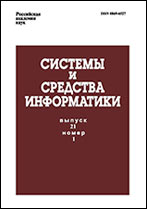|
This article is cited in 3 scientific papers (total in 3 papers)
Situational model of universal agreement in a digital environment
A. V. Ilyina, V. D. Ilyinb
a State Research Institute of Aviation Systems, 7 Viktorenko Str., Moscow 125319, Russian Federation
b A. A. Dorodnicyn Computing Center, Federal Research Center "Computer Science and Control" of the Russian Academy of Sciences, 40 Vavilova Str., Moscow 119333, Russian Federation
Abstract:
The situational model of universal agreement programmatically implementable in the digital environment (UDE-agreement) is considered as a part of the methodological support for implementation of contractual relations. Universal agreement in the digital environment may reflect property relations (bank agreement, trade agreement, etc.), labor relations (employment contract, work contract, etc.), and any other relations of the contracting parties (individuals and/or legal entities). Universal agreement in the digital environment is a system of mandatory and orienting requirements that determine the behavior and statuses of the parties. The fulfilling of the UDE-agreement is represented by the situations determined in the agreement. Situation-specific data are supplied by digital twins serving the UDE-agreement. These data are transmitted to the input of the UDE-agreement software running on computer devices (smartphones, laptops, etc.) of the parties. The situational model of UDE-agreement is based on the idea of a smart contract proposed by Nick Szabo and the methodology of situational informatization developed by the authors. The model can be applied in development of technologies for arbitrary contractual relations implementable in the digital environment.
Keywords:
universal agreement in the digital environment (UDE-agreement), situational model of the UDE-agreement, technology of contractual relations, smart contract, digital twins serving the UDE-agreement.
Received: 12.07.2020
Citation:
A. V. Ilyin, V. D. Ilyin, “Situational model of universal agreement in a digital environment”, Sistemy i Sredstva Inform., 30:3 (2020), 154–162
Linking options:
https://www.mathnet.ru/eng/ssi727 https://www.mathnet.ru/eng/ssi/v30/i3/p154
|

|




 Contact us:
Contact us: Terms of Use
Terms of Use
 Registration to the website
Registration to the website Logotypes
Logotypes








 Citation in format
Citation in format 
